山西省阳泉市荫营中学高考英语 Unit 7 Living with disease复习教案 新人教版
- 格式:doc
- 大小:92.50 KB
- 文档页数:3
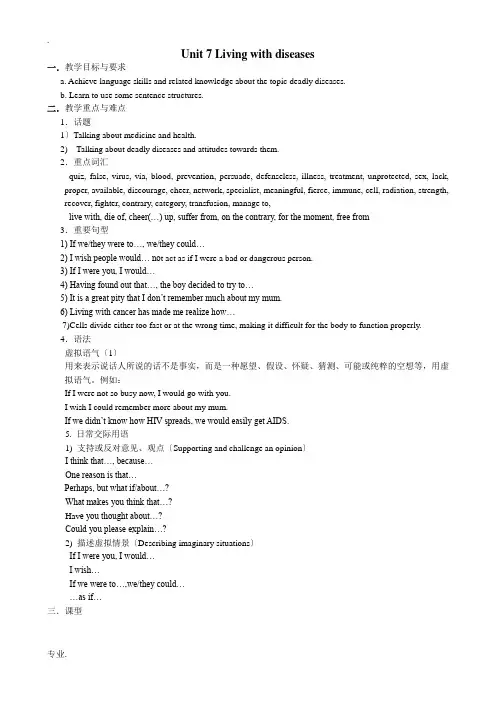
Unit 7 Living with diseases一.教学目标与要求a. Achieve language skills and related knowledge about the topic deadly diseases.b. Learn to use some sentence structures.二.教学重点与难点1.话题1〕Talking about medicine and health.2) Talking about deadly diseases and attitudes towards them.2.重点词汇quiz, false, virus, via, blood, prevention, persuade, defenseless, illness, treatment, unprotected, sex, lack, proper, available, discourage, cheer, network, specialist, meaningful, fierce, immune, cell, radiation, strength, recover, fighter, contrary, category, transfusion, manage to,live with, die of, cheer(…) up, suffer from, on the contrary, for the moment, free from3.重要句型1) If we/they were to…, we/they could…2) I wish people would… no t act as if I were a bad or dangerous person.3) If I were you, I would…4) Having found out that…, the boy decided to try to…5) It is a great pity that I don’t remember much about my mum.6) Living with cancer has made me realize how…7)Cells divide either too fast or at the wrong time, making it difficult for the body to function properly.4.语法虚拟语气〔1〕用来表示说话人所说的话不是事实,而是一种愿望、假设、怀疑、猜测、可能或纯粹的空想等,用虚拟语气。
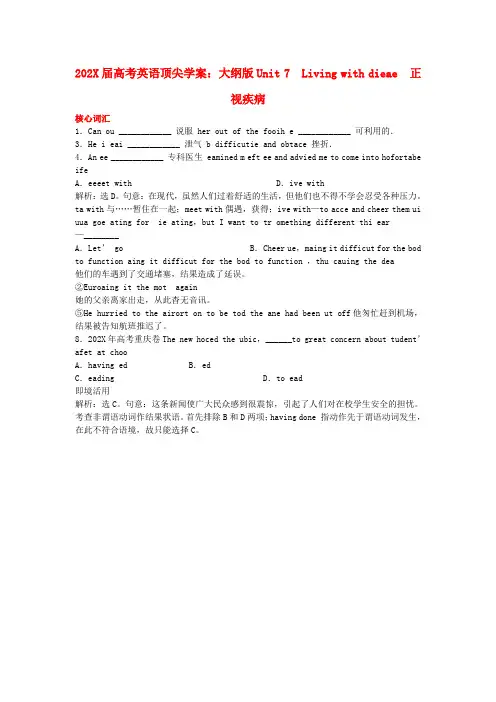
202X届高考英语顶尖学案:大纲版Unit 7 Living with dieae 正视疾病核心词汇1.Can ou ____________ 说服 her out of the fooih e ____________ 可利用的.3.He i eai ____________ 泄气 b difficutie and obtace 挫折.4.An ee ____________ 专科医生 eamined m eft ee and advied me to come into hofortabe ifeA.eeeet with D.ive with解析:选D。
句意:在现代,虽然人们过着舒适的生活,但他们也不得不学会忍受各种压力。
ta with与……暂住在一起;meet with偶遇,获得;ive with—to acce and cheer them ui uua goe ating for ie ating,but I want to tr omething different thi ear—________A.Let’ go B.Cheer ue,maing it difficut for the bod to function aing it difficut for the bod to function ,thu cauing the dea他们的车遇到了交通堵塞,结果造成了延误。
②Euroaing it the mot again她的父亲离家出走,从此杳无音讯。
⑤He hurried to the airort on to be tod the ane had been ut off他匆忙赶到机场,结果被告知航班推迟了。
8.202X年高考重庆卷The new hoced the ubic,______to great concern about tudent’afet at chooA.having ed B.edC.eading D.to ead即境活用解析:选C。
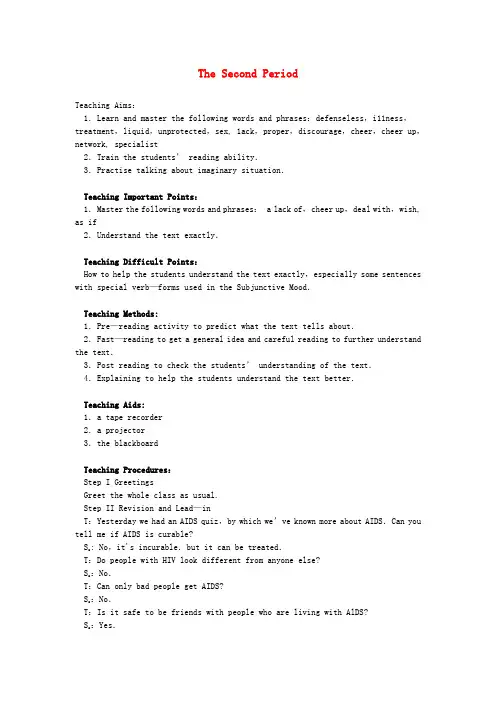
The Second PeriodTeaching Aims:1.Learn and master the following words and phrases:defenseless,i11ness,treatment,liquid,unprotected,sex, 1ack,proper,discourage,cheer,cheer up,network, specialist2.Train th e students’ reading ability.3.Practise talking about imaginary situation.Teaching Important Points:1.Master the following words and phrases: a lack of,cheer up,deal with,wish, as if2.Understand the text exactly.Teaching Difficult Points:How to help the students understand the text exactly,especially some sentences with special verb—forms used in the Subjunctive Mood.Teaching Methods:1.Pre—reading activity to predict what the text tells about.2.Fast—reading to get a general idea and careful reading to further understand the text.3.Post reading to ch eck the students’ understanding of the text.4.Explaining to help the students understand the text better.Teaching Aids:1.a tape recorder2.a projector3.the blackboardTeaching Procedures:Step I GreetingsGreet the whole class as usual.Step II Revision and Lead—inT:Yesterday we had an AIDS quiz,by which we’ve known more about AIDS.Can you tell me if AIDS is curable?S s: No,it's incurable.but it can be treated.T:Do people with HIV look different from anyone else?S s:No.T:Can only bad people get AIDS?S s:No.T:Is it safe to be friends with people who are living with AlDS?S s:Yes.T:Very good.Today we are going to read a text about a person living with AIDS.First,let’s learn the new words in this period.Look at the screen.(Teacher shows the screen and deals with them briefly.)△immune/ I′mju:n/ adj.i1lness/′IlnIs / n.liquid/′1Ikwld/n.sex/seks/n.;adj.lack/laek/n.;ut.& ut.discourage/dI′sk∧rId3/ut.network/′naetwэ: k/n.defenseless/dI′fenslIs/adj.treatment/′tr i: tm∂nt/n.unprotected/∧npr∂′tektId/adj.△trans fusion/traens′ fju:зn/n.proper/ ′prDp∂(r)/adj.cheer/t⎰I∂(r)/vispecialist/′spe⎰∂1Ist/n.Step 111 ReadingT:Well, so much for the new words.Before reading the text.please write down four questions you think will be answered in the text.I give you two minutes to prepare. Then I’ll collect your questions.Predicted questions:1.What kind of person is he / she?2.How did he/she get AIDS?3.Can people contact him/her?4.Does he / she feel discouraged?(After that)T:OK.Now read the text at Page 51 quickly and find the answers to the questions you listed just now.If there are any questions that the text did not answer,try to think why those questions were not answered.Are you clear?S s:Yes.T:You can begin now.(After a while, teacher asks some students to answer their predicted questions.) Suggested answers:1.She is l5一year—old teenager.2.She got AIDS through birth.3.Yes,they can.4.No, she doesn't.T:Well done.Now,please read it carefully again and add more questions to your list so that you have at least one question for each of the main points in the text.Then work in pairs to ask your partner to answer your questions.You can begin now.(Teacher may check their work a few minutes later.)Suggested questions and answers:1.Q:What kind of disease is AIDS?A:AIDS is a disease that breaks down the body’s immune system and 1eaves a person defenseless against infections and illness.2.Q:Where is the disease spreading faster? And why?A:In Africa and parts of Asia.Mainly because of a lack of proper health care, prevention and education.3.Q:Which kind of people suffers the most?A:The young.4.Q:What did Xiao Hua decide to do after she knew she got AIDS?A:She decided to use the limited time she has left to do something to help others.5.Q:Is the disease the only thing that AIDS patients have to suffer from ?A:No.They also have to deal with people’s fear of the disease.6.Q:What is the best way to show that you care about AIDS patients ?A:Giving an AIDS patient a hug.T:Well,now please scan the reading passage and find out the difference between AIDS and HIV and the ways of AIDS spreading.(Teacher allows the students to read for a while,and then check the answers.) T:Are you ready?S s:Yes.T:Who’d like to tell the difference between AIDS and HIV?S1:Let me have a try.HIV is the virus that caused AIDS.AIDS is a kind of incurable disease.People get AIDS after having been infected with HIV virus.T:Thank you.Sit down.In what way does AIDS spread? Any volunteer?S2:AIDS spreads through b1ood and other body liquids.People transmit HIV by having unprotected sex,by receiving infected b1ood transfusions or through birth.T:Well done.Now 1et’s learn some useful phrases in the text.Look at the screen.(Teacher shows the screen and gives brief explanations.)1. break down:cause sth.to collapse;destroy sth.e.g.How can we break down the barriers of fear and hostility which divide the two communities ?2.a 1ack of:absence or shortage(of sth. that is needed)e.g.The poor girl felt 1onely because of a 1ack of care.The project had to be abandoned for? lack of funds.3.cheer(…)up:(cause sb.to)become happier or more cheerfule.g.Try and cheer up a bit;life isn’t that bad!You look as though you need cheering up(= to be cheered up).4.suffer from:feel pain,discomfort,great sorrow, etc.e.g.Do you suffer from headaches? She’s suffering from loss of memory.5.deal with:attend to(a problem,task, etc)e.g.You dealt with an awkward situation very tactfully.(Bb:break down,a lack of,cheer(…)up,suffer from, deal with)(After explaining the phrases,teacher says the following.)T:So much for the phrases.If you still have any difficulty in understanding the text,you can ask me.S:Why in some sentences “were” is used after “I” and “she”,especially after“I wish”,“as if ”and“if”?T:Oh, you are careful.I'1l explain to you.Here “were”is used as the subjunctive form to talk about events and situations which are not certain to hap—pen--which we hope will happen,or imagine might happen or want to hap—pen.For example, the sentence “I wish I could remember more about my mum.”means“It is a great pity that I don’t remember much about my mum.”The sentence“If I were to live long enough to have a job,I would choose to be a doctor,helping these AIDS patients “means” I want to become a doctor, helping these AIDS patients, but I can’t, be cause l won’t live long enough to have a job.”T he sentence“…not act as if I were a bad or dangerous person.”means“I hope peo ple don’t treat me as a bad or dangerous person.”1s that clear?Ss:Yes.T:Well, now please listen to the tape and try to understand it further.Then read it aloud for a while and talks about these two questions on the screen in groups of four.(Teacher shows the questions on the screen.)1.How do you think you would react if you were Xiao Hua?2.How should we act towards people who have AIDS What can we do to help them? (After the students listen to the tape and talk about the questions for a few minutes, teacher asks some students to give their opinions.)T:Well,stop.Who’d like to give us your opinion about the first question? Volunteers?S1:If I were Xiao Hua,I might be discouraged,but after l read the story about her,l think l should try to live 1ike her and do some meaningful things for the AIDS patients and the society.S2:If 1 were Xiao Hua.I think 1 would appreciate every minutes of each day before my death and leave my smiles to my friends and patients.S3:……T:What about the second question?S4:We should not have the wrong attitude towards people who have AIDS.Don’t consider them as bad and dangerous persons and look down upon them.On the contrary,we should try our best to help them and care about them.We can help to spread the knowledge about AIDS, such as the major ways for HIV to spread and prevention and treatment treasures. This way, AIDS patients would feel less lonely and more people can be prevented from being infected.S5:……T:You all did very well.Thank you.Sit down,please.Step V Summary and HomeworkT:In this class,we’ve not onl y learned more about AIDS, but also 1earnt how to act towards people who have A1DS.We should call on a11 the people to fight against AIDS.Besides, we’ve1earned some useful words and phrases as well as some useful structures with the Subjunctive Mood used in it.After class,please read the text more times to make sure you’ve really understood it and master the useful language points.Step VI The Design of the writing on the BlackboardUnit 7 Living with disease The Second PeriodI. Useful expressions:break down, a lack of, cheer(…)up, deal with, suffer fromII. Sentence structures:… were1. I wish / as if… would / could dowere…, …2. If Iwere to…, …Step VII Record after Teaching。
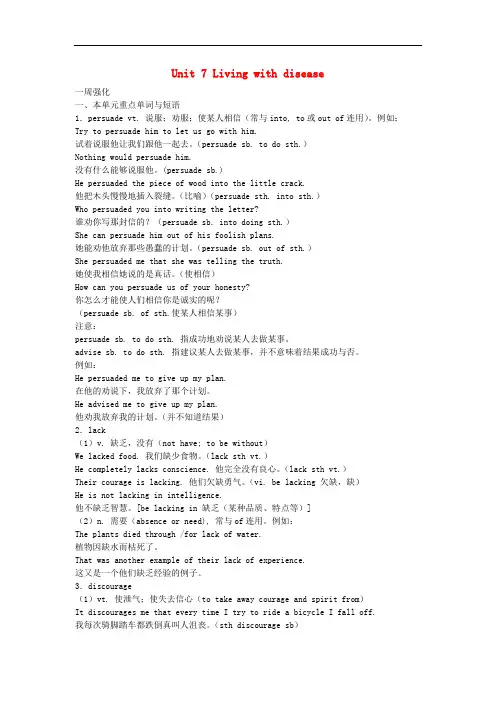
Unit 7 Living with disease一周强化一、本单元重点单词与短语1.persuade vt. 说服;劝服;使某人相信(常与into, to或out of连用)。
例如:Try to persuade him to let us go with him.试着说服他让我们跟他一起去。
(persuade sb. to do sth.)Nothing would persuade him.没有什么能够说服他。
(persuade sb.)He persuaded the piece of wood into the little crack.他把木头慢慢地插入裂缝。
(比喻)(persuade sth. into sth.)Who persuaded you into writing the letter?谁劝你写那封信的?(persuade sb. into doing sth.)She can persuade him out of his foolish plans.她能劝他放弃那些愚蠢的计划。
(persuade sb. out of sth.)She persuaded me that she was telling the truth.她使我相信她说的是真话。
(使相信)How can you persuade us of your honesty?你怎么才能使人们相信你是诚实的呢?(persuade sb. of sth.使某人相信某事)注意:persuade sb. to do sth. 指成功地劝说某人去做某事。
advise sb. to do sth. 指建议某人去做某事,并不意味着结果成功与否。
例如:He persuaded me to give up my plan.在他的劝说下,我放弃了那个计划。
He advised me to give up my plan.他劝我放弃我的计划。
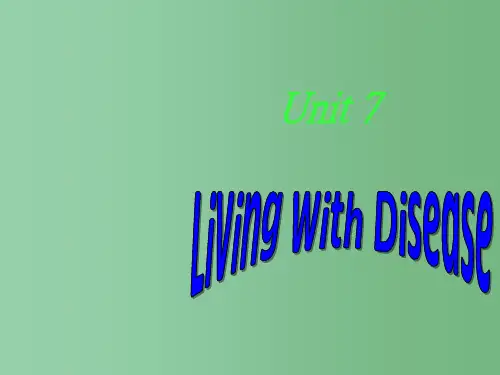
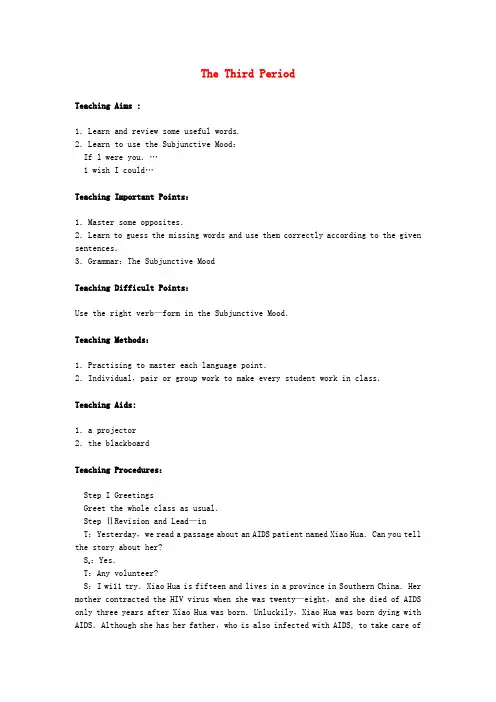
The Third PeriodTeaching Aims :1.Learn and review some useful words.2.Learn to use the Subjunctive Mood:If l were you.…1 wish I cou ld…Teaching Important Points:1.Master some opposites.2.Learn to guess the missing words and use them correctly according to the given sentences.3.Grammar:The Subjunctive MoodTeaching Difficult Points:Use the right verb—form in the Subjunctive Mood.Teaching Methods:1.Practising to master each language point.2.Individual,pair or group work to make every student work in class.Teaching Aids:1.a projector2.the blackboardTeaching Procedures:Step I GreetingsGreet the whole class as usual.Step ⅡRevision and Lead—inT:Yesterday,we read a passage about an AIDS patient named Xiao Hua.Can you tell the story about her?S s:Yes.T:Any volunteer?S:I wi11 try.Xiao Hua is fifteen and lives in a province in Southern China.Her mother contracted the HIV virus when she was twenty—eight,and she died of AIDS only three years after Xiao Hua was born.Unluckily,Xiao Hua was born dying with AIDS.Although she has her father,who is also infected with AIDS, to take care ofher, they cannot afford the drugs to treat her illness.Xiao Hua knows that she will die before she has a chance to grow o1d, but she does not let that knowledge discourage her. Instead,she decided to use the limited time she has left to do something to help others.She not only help people learn more about how to protect themselves, but also persuade people to show care and love to AIDS patients.She makes her life happy and beautiful.T:Thank you.Sit down,please.Besides, we’ve learnt some useful words and sentence structures in it.Today we’11practise using them.Now,let’s learn the new words in this period.Look at the screen.(Teacher shows the screen and deals with the words briefly.)△vis ible/′vIz∂bl/adj.△defens ive/dI′fens Iv/adj.identify/al′dentIfaI/vt.stranger/′streIndз∂(r)/n.meaningful/′mi:nIηfl/adj.boyfriend/′boIfre nd/n.bi11ionaire/bIlj∂′ne∂(r)/n.Step Ⅲ Word StudyT:Well,now please open your books at Page 52, Look at the first part--Word study.Choose the right word in each sentence.Turn to next page and let’s study the example.“visibl e”and “in visi ble”,which are opposite in meaning,are givenin the bracket.The prefix “in一”gives a negat ive meaning.According to the meaningof the given sentence.“inv isib le”is chosen. Have you understood the example?(Bb:visible—invisible)S s:Yes.T:In the following sentences,some other pairs of opposites are given in the brackets.Now please work in pairs to choose the proper word for each sentence.Aftera while, I will check your answers.Suggested answers:1.infected with 2.incurable3.imaginary 4.defenseless(Teacher writes each pair of opposite on the blackboard.)T:Well done.Now it’s your turn to make sentences.Look at the next part.Four pairs or opposites are listed.You are asked to use one of each pair of the wordsto make your own sentences. T hen show them to your partner and correct each other’s errors.Are you clear?S s:Yes.Suggested sentences:1.1n winter, plants should be protected from the cold.The so1diers were unprotected against the enemy’s surprise attacks.2.He said something proper for the occasion. Laughing and joking are considered improper behaviour at a funeral.3.She was suffering from a headache.She enjoys listening to music.4.Our teacher encouraged us to speak English in class.Don't discourage her;she’s doi ng her best.(Bb:protected/unprotected;proper/improper;suffer/enjoy;encourage/discourage)T:Next,1ook at the third part.Read the following sentences and try to finda word from the text to complete each sentence.Study the example first, Then finish your work individually.At the end,check your answers with your partner and correct mistakes.Suggested answers:1.persuaded 2.patients3.drugs 4.infected5.suffering 6.cure7.contracted 8.virusStep IV GrammarT:Well,so much for Word study.1n the text about Xiao Hua, we’ve also learnt some sentences in the Subjunctive Mood.Now please look at the sentences on the screen.l.I wish I could remember more about my mum.2.I wish she were here with me and that we weren’t sick.3.I wish people would find out the facts and not act as if I were a bad or dangerous person.4.If I were you,I would give an AIDS patient a hug.5.If I had HIV,I would know because I would feel sick.Pay attention to the underlined parts.We can see the Subjunctive Mood in each sentence is expressed with a special verb—form.For example,after “wish”and “as if”, a past tense is used to express a present meaning,“would +aninfinitive ”to express a future mean ing.Is that so?S s:Yes.T:Then what about the verb form after “if”?S s:The past tense is used in the if—clause and “would+an infinitive ”is usedin the main clause to express a present or future meaning.T:Quite right.And we should remember the Subjunctive form “were” is often used instead of “was”;“was”is possible more common in conversational English.Are you clear?S s:Yes.(Bb:I wish…;…as if…;lf I were…,…)T:A11 right.Now please write sentences to explain the sentences on the screen. For example, the first sentence “I wish I cou ld…”means“It is a great pity t hat I don’t remember much about my mum.”Can you understand?S s:Yes.T:OK.Now please prepare for a while. T hen I’ll c heck your work.Suggested answers:2.It is a great pity that she is not here with me but died of AIDS and that I’m sick,too.3.I want people to find out the facts and not consider me as a bad or dangerous person.4.I suggest that you give an AIDS patient a hug.5.Imagine that I have HIV.I will know because I wi11 feel sick.T:Well done! Now,please 1ook at the pictures in our books and make wishes using the Subjunctive Mood.Suggested answers:① I wish I would become an engineer.② I wish I were one of the stars in the sky.③ I wish I could get a big house.(Then teacher asks the students to finish the rest of the parts in Grammar, First individually.Then check in pairs.At the end,teacher asks some students to read their answers and check with the whole class.)Suggested answers:Part 3:1.I wish I could solve my problems.2.I wish I had not been working so hard.3.I wish I could forget the terrible scene.4.I wish we had enough money.5.I wish the performance would go well.6.I wish I had many friends.Part 4:1.If I had enough money,I would want to buy these books.2.If it were not co1d and wet outside,we would let the children playin the garden.3.If you were not wasting so much time to play computer games,I wouldbe like you.4.1f he had not to work hard all day 1ong, he would have time to do the shopping.Part 5:1.If I were a famous person for a day,I would help to spread knowledge about AIDS.2.If I could be invisible for a day, I would be free and relax without any study oppression.3.If I were a billionaire, I would help children living with AIDS like Xiao Hua.4.If I could change one thing about myself,I would be very happy to change my height.5.If I were the teacher,I would love my students as if they were my children.Part 6:1.Sarah looks at her husband as if he were a stranger.2.They are talking as if they were friends.3.Mr Hammer speaks to me as if I were a kid.4.I remember the whole thing as if it had happened yesterday.Step V Summary and HomeworkT:In this class, we’ve mainly done some exercises to practise using opposites and the Subjunctive Mood.After class,please practise more and preview the contentsof the next period.Step Ⅵ The Design of the Writing on the BlackboardUnit 7 Living with disease The Third Period I.Opposites:visible/invisible,infected with/immune tocurable/incurable,imaginary/realdefensive defenseless,protected/unprotectedproper/unproper,suffer/enjoyencourage/discourageII.Grammar:were/did…(present)I with thatwould + do…(future)were/did…(present)…as ifwould + do…(future)If I were…,…wou ld do…Step Ⅶ Record after Teaching。
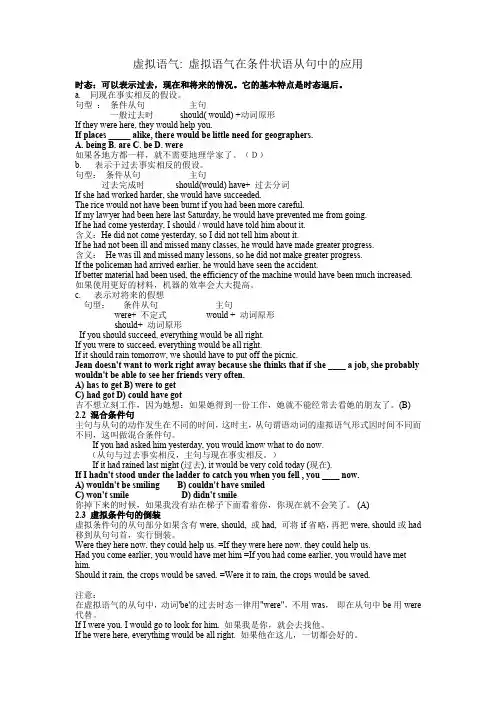
虚拟语气: 虚拟语气在条件状语从句中的应用时态:可以表示过去,现在和将来的情况。
它的基本特点是时态退后。
a.同现在事实相反的假设。
句型:条件从句主句一般过去时should( would) +动词原形If they were here, they would help you.If places _____ alike, there would be little need for geographers.A. beingB. areC. beD. were如果各地方都一样,就不需要地理学家了。
(D)b.表示于过去事实相反的假设。
句型:条件从句主句过去完成时should(would) have+ 过去分词If she had worked harder, she would have succeeded.The rice would not have been burnt if you had been more careful.If my lawyer had been here last Saturday, he would have prevented me from going.If he had come yesterday, I should / would have told him about it.含义:He did not come yesterday, so I did not tell him about it.If he had not been ill and missed many classes, he would have made greater progress.含义:He was ill and missed many lessons, so he did not make greater progress.If the policeman had arrived earlier, he would have seen the accident.If better material had been used, the efficiency of the machine would have been much increased. 如果使用更好的材料,机器的效率会大大提高。
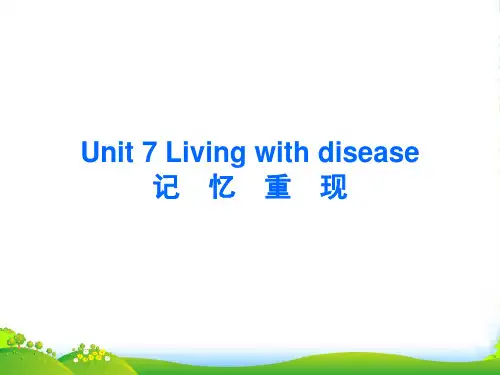
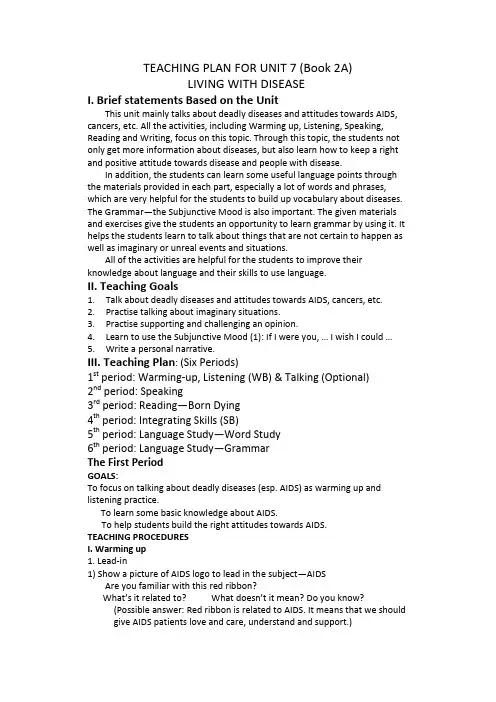
TEACHING PLAN FOR UNIT 7 (Book 2A)LIVING WITH DISEASEI. Brief statements Based on the UnitThis unit mainly talks about deadly diseases and attitudes towards AIDS, cancers, etc. All the activities, including Warming up, Listening, Speaking, Reading and Writing, focus on this topic. Through this topic, the students not only get more information about diseases, but also learn how to keep a right and positive attitude towards disease and people with disease.In addition, the students can learn some useful language points through the materials provided in each part, especially a lot of words and phrases, which are very helpful for the students to build up vocabulary about diseases. The Grammar—the Subjunctive Mood is also important. The given materials and exercises give the students an opportunity to learn grammar by using it. It helps the students learn to talk about things that are not certain to happen as well as imaginary or unreal events and situations.All of the activities are helpful for the students to improve their knowledge about language and their skills to use language.II. Teaching Goals1.Talk about deadly diseases and attitudes towards AIDS, cancers, etc.2.Practise talking about imaginary situations.3.Practise supporting and challenging an opinion.4.Learn to use the Subjunctive Mood (1): If I were you, … I wish I could …5.Write a personal narrative.III. Teaching Plan: (Six Periods)1st period: Warming-up, Listening (WB) & Talking (Optional)2nd period: Speaking3rd period: Reading—Born Dying4th period: Integrating Skills (SB)5th period: Language Study—Word Study6th period: Language Study—GrammarThe First PeriodGOALS:To focus on talking about deadly diseases (esp. AIDS) as warming up and listening practice.To learn some basic knowledge about AIDS.To help students build the right attitudes towards AIDS.TEACHING PROCEDURESI. Warming up1. Lead-in1) Show a picture of AIDS logo to lead in the subject—AIDSAre you familiar with this red ribbon?What’s it related to? What doesn’t it mean? Do you know?(Possible answer: Red ribbon is related to AIDS. It means that we should give AIDS patients love and care, understand and support.)2) Show a picture of Pu Cunxin and other stars to show that AIDS is a worldwide problem.Do you know them? What is their job besides acting?Is it just the problem in China?(Possible answer: It’s not just the problem in China. It’s a worldwideproblem. And besides some famous stars, some ordinary people alsowork very hard to tell others the harm of this disease.)2. BrainstormingQ1: While talking about AIDS, what other diseases can you think of? Individual work: Let students brainstorm the names of diseases, such as cold, headache, toothache, diarrhoea, cut, coughing, scald, insomnia,heart attack, cancer, AIDS, etc.(With the development of science and hi-tech, many diseasescan be cured. But for now, AIDS is still incurable, so it’s a deadlydisease.)3. How much do you know about AIDS?1) Pair work—questions for discussionWhat’s the full name of AIDS?Can AIDS be transmitted?In what ways can it be transmitted?What kinds of people are likely to get AIDS?Do people with AIDS look healthy at first?Is it safe or dangerous to stay or to be friends with them? Why? (Students don’t have to give the exact answers. These questions will help them think about this disease—AIDS.)2) AIDS QUIZ (individual work)1) AIDS quiz (p.49)—check students’ knowledge about AIDS.2) Picture quiz —Can the AIDS virus transmitted via the following routes? Summary: Medical studies show that the AIDS virus cannot be transmitted via the following routes: cups, glasses, toilet seats, swimming pools,mosquitoes, other insects or giving blood. So it’s safe to be friendswith AIDS patients.II. Listening (WB)1.Pre-listening: Go through EX1&2 in Part1 and guess “What do the lettersHIV and AIDS stand for?”2.While-listening: Listen to the tape and finish exercises in Part1&2.(Make good use of some pictures and a flash “HIV-cycle” in the PowerPoint)3.Post-listening: Suppose you are a publicist of AIDS, please give an oralreport about it to the whole class.III. Talking (Optional)Role play: Work in groups. Imagine that the headmaster of a school has found out that one of the students has HIV. The student’s family has kept it a secret until now and the headmaster only learnt the truth last week. He had called a meeting to decide what to do.(Opinions can be based on their knowledge of AIDS and also the characteristics of the roles.)IV. Homework1. P review Speaking (p. 50) and find some information about AIDS, drugs, smoking ordrinking to support your idea.2. L earn the new words of this unit by heart.。